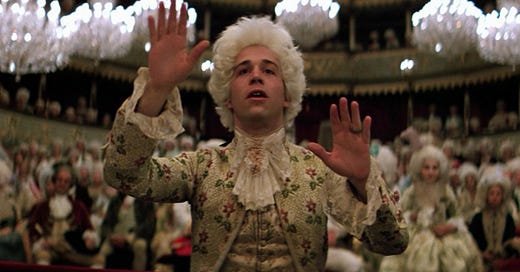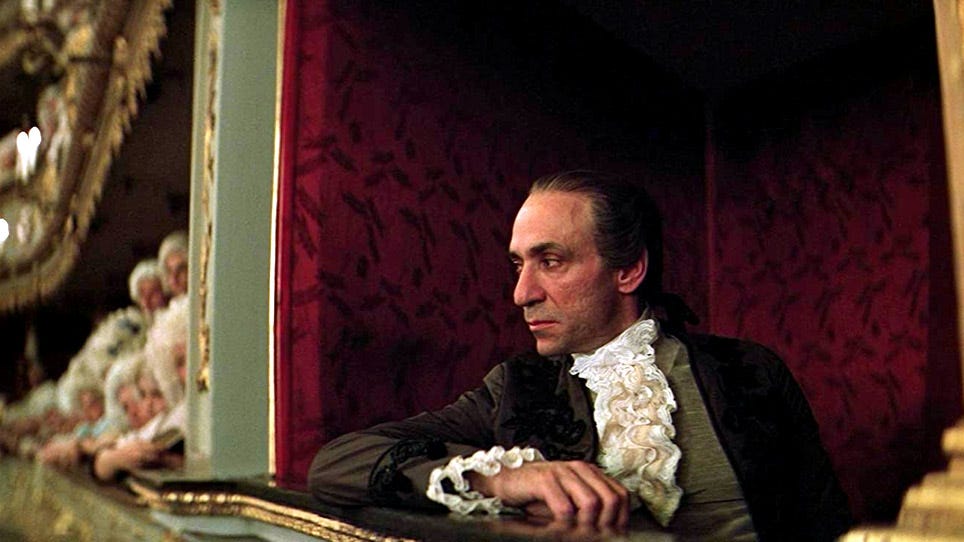Classic Review-Amadeus
A musical and visual spectacle that plays with what you think you know about one of history's greatest composers
Last week I posted a Note here on Substack asking for movie recommendations with the stipulation that I would watch it within the week and provide a review. My reviews were backed up a bit, so I’m a bit behind, but here is my first review of those recommended movies.
The recommendation came from
who writes where she shares her experiences from working in film and television post-production. If you’re looking for the inside scoop on the entertainment world, give her a follow.First off, this film is 40 years old, so we’re going pretty far in the Way Back Machine today. Also, I’m a bit ashamed that it has taken me 40 years to actually sit down and watch this film. I spent my entire grade school years taking piano lessons, and played plenty of Mozart (among others). I also played in the school band, orchestra, and marching band, so Mozart and his contemporaries were ever present in my musical life for many years.
What I am happy to report, is that Amadeus remains a strong film after all these years, and deserving of the recognition it received in 1984. For those who (like me until recently) have never seen it, the film is told my Antonio Salieri (a splendid F. Murray Abraham) who relates his dealings with Mozart (Tom Hulce) to a priest, in a sort of last moment confession. It’s a tried and true framing device used in films (and books, and plays, etc.) and is employed with great effect here.
The main action of the film begins with Mozart as a young musical prodigy but quickly advances to his time in Vienna in the in the later stages of his life. Salieri spends his time in the presence of Emperor Joseph II (Jeffrey Jones) and is eventually introduced to Mozart, whom he had heard about through the grapevine of Viennese society. During an early encounter, Mozart insults Salieri by playing one of his pieces entirely by memory (after hearing it only once) and immediately attempting to improve on the Italian’s composition.
The pair continue to connect and butt heads over several years as Mozart composes for the Emperor but struggles to make any money to support his family, and his own expensive habits of drinking and generally living life to the fullest. In this manner, Director Miloš Forman shows Mozart as the rock star of his day. Flashy hair and dress (compared with Salieri’s more subdued costuming), drinking and fraternizing to excess (compared with Salieri living modestly) and ultimately landing in an early grave at 35 (compared with Salieri living to the relatively advanced age of 74).
A brief aside here, the list of famous musicians who died young is tragically long and includes names like Kurt Cobain, Jimi Hendrix, Janis Joplin, Jim Morrison, (all died at 27) Buddy Holly (22), and more recently Tupac Shakur (25) and Amy Winehouse (also 27). As I looked through lists of these artists, several trends appeared with many passing due to drug overdoses, murder, and vehicle accidents. While the drugs may have changed in 250 years, the results sadly remain the same.
On the flip side of the story, we repeatedly see Salieri affirm his devotion to God early in the film, praying that he would become a great composer, only to renounce God when he sees Mozart’s gift with music, vowing to destroy Mozart in revenge. Mozart, in his obliviousness, never sees this and believes that Salieri is his friend and colleague. But Mozart’s wife Constanze (Elizabeth Berridge) sees right through Salieri, even attempting to convince the Italian to help her husband by throwing herself at his feet.
The performances in the film are strong, but especially Abraham. His Salieri is truly the main character of the film, despite the title referring to his rival. We see his torment throughout, trying to rationalize Mozart’s genius with his behavior and figure out a way to achieve what Mozart has while at the same time not compromising his morals. His is the most complex character, having such hatred for Mozart, yet also caring for him (in a somewhat twisted way) when Mozart collapses at a performance of The Magic Flute. Yes, he’s trying to get Mozart to finish the Requiem Mass that Salieri himself commissioned (in disguise) so that he may steal the work upon Mozart’s death. But there is a true reverence displayed in the film. Mozart repeatedly thanks Salieri for being his only peer willing to show up to Mozart’s performances, so Salieri had to admire Mozart, even if he hated him at the same time.
Speaking of Mozart’s performances, I appreciated Hulce’s portrayal of Mozart, but was terribly annoyed by him throughout. Anyone who has seen the film can hear that Mozart cackle that he employs throughout the film to break tension and while I understand it’s utility, I found it distracting and irritating. There certainly had to be a better way to show his juvenile mannerisms than that!
Of course, I would be remiss if I didn’t mention the music in the film. Of course there is plenty of Mozart in the soundtrack, and it is performed beautifully. As a lover of music performance who has performed Mozart’s work personally, I would have like to see a film that focused a bit more on the music itself, but I understand the need for a juicy story to sell tickets. Just the fact that we get an entire 3 hour film with almost nothing but Mozart music in it is treat enough.
Which brings me to my last point, and that is the version that I watched. The film was originally released in a 2 hour 40 minute cut with a PG rating. When I sat down to watch, I was surprised to see Constanze bare her breasts to Salieri in a PG film, but soon discovered that the 3 hour director’s cut I was watching was rated R and can only assume this was one of the added scenes (or shots). I would be interested to go back and watch the original version, because the extended cut did seem to drag a bit in parts. I understand the need of a director to stick to his or her vision for the film, but sometimes editors know what they are doing and can improve the pacing of the film by cutting things out.
Despite many historical inaccuracies, Amadeus is deserving of many of the accolades bestowed on it at the time. Receiving Oscars for Best Costume Design, Best Makeup, Best Sound, Best Art Direction, Best Adapted Screenplay, Best Actor (Abraham, though Hulce was also nominated), Best Director, and Best Picture, the film remains among those to receive the most Oscars in a single year, placing it among great films like Gone with the Wind, Gandhi, From Here to Eternity, and On the Waterfront. In fact, only five films have won 8 Oscars or more in the 40 years since.
8/10






